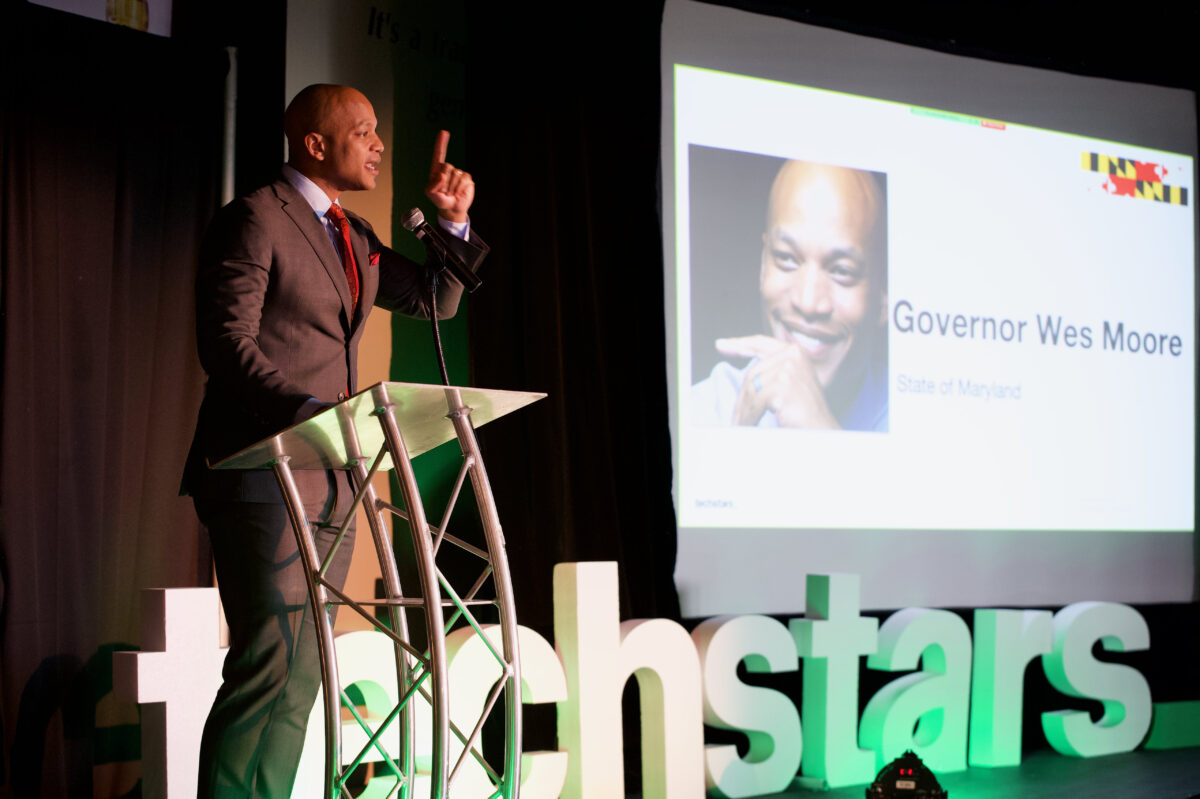They, like leaders of eight other startups from Baltimore and beyond, recently celebrated the end the 13-week Techstars Equitech Accelerator program on Tuesday with a special demo day and reception at M&T Bank Stadium. Launched in 2021 by national accelerator producer Techstars and local entrepreneurship support-focused entity UpSurge Baltimore, the accelerator takes its name from the “equitech” concept that UpSurge coined and has championed since its inception.
“We brought Techstars to Baltimore because they are a global tech community with a megaphone that reaches hundreds of thousands of founders, investors and ecosystem builders around the world,” explained Jamie McDonald, CEO of Upsurge Baltimore, in an email to Technical.ly.
Techstars and UpSurge Baltimore’s shared megaphone caught the ears of high-profile demo day attendees like Mayor Brandon Scott and Gov. Wes Moore, the latter of whom delivered a keynote address imploring the startup world denizens in attendance to work toward a more equitable and robust local economy.
“We are building a city that understands it can be both more competitive and more equitable — and it is not a choice, we are going to do both,” said Gov. Moore, who had a varied entrepreneurial and business career prior to becoming governor in 2023.
Here are some key details from the demo day, including the companies involved, the equitech-focused legislation going through Maryland’s General Assembly and more.
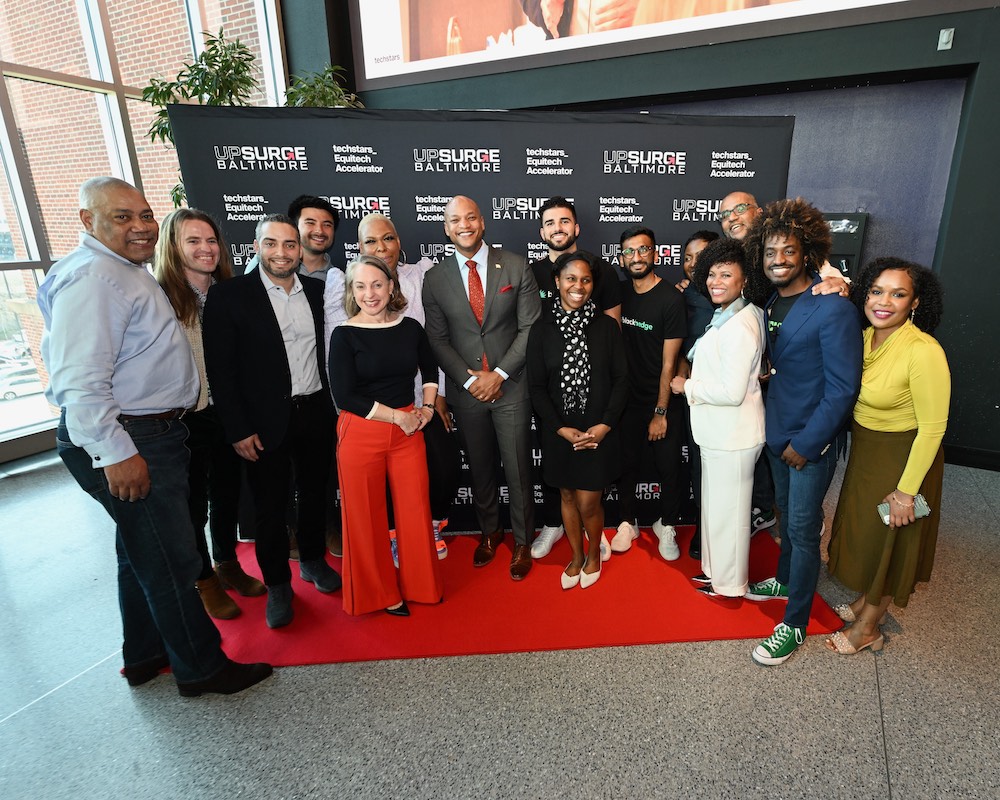
Gov. Wes Moore (center, red tie) poses with Techstars Equitech Accelerator founders and staff. (Courtesy photo by Joe Andrucyck, Governor’s Office)
The cohort
Selection criteria for companies in the second Equitech Accelerator cohort included being grounded in the values of diversity, having founders from underestimated communities and developing technologies that increased access and equity. Participant startups’ foci encompassed such industries as cyber, public health, beauty, edtech, fintech and govtech.
The Baltimore region is home to half of the cohort, which comprises the following companies:
- CyDeploy, a cybersecurity company whose AI-driven testing system landed it on Technical.ly’s 2022 RealLIST Startups roster.
- Divaneering Lab, which created the Spundle, a blow dryer for wigs and similar detached hair pieces that is designed to reduce the time and heat damage associated with other hand dryers
- Richualist (formerly THE MOST), a developer of multipurpose hairstyling tools and products aimed at Black women and other women of color who want to embrace their natural hair (Psst: see founder Dawn Myers in this DC mural)
- VecTech, a biomedical tech company behind diagnostic tools for fighting vector-borne diseases whose CTO Adam Goodwin was one of our 2022 RealLIST Engineers
- ReBokeh, a life sciences tech company and a 2023 RealList startup that developed special smartphone video filters for people with visual impairment; the company’s staff recently exhibited and participated in a pitch competition at the CES trade show.
The remaining participants came from throughout the US:
- BlackHedge (Jacksonville, Florida), a fintech developer whose platform uses AI to help retail investors predict stock market trends and better manage their investment portfolios
- Frontline (Norfolk, Virginia), a gig work-facilitating app to help source workers for clean-up operations and other “green jobs,” according to the company’s website
- Pickups (Brooklyn, New York), a company that partners with retailers and carriers to facilitate hyperlocal supply chains by letting willing neighbors with storage space hold on to people’s packages
- Sanitas (Los Angeles, California), a platform to help people of color find and build support communities for mental health concerns
- TechRow (New York, New York), a media company that provides immersive, VR-driven learning experiences to schools and other educational institutions
All of the founders also participated in programming with funders, founders and other ecosystem leaders from throughout the region and country.
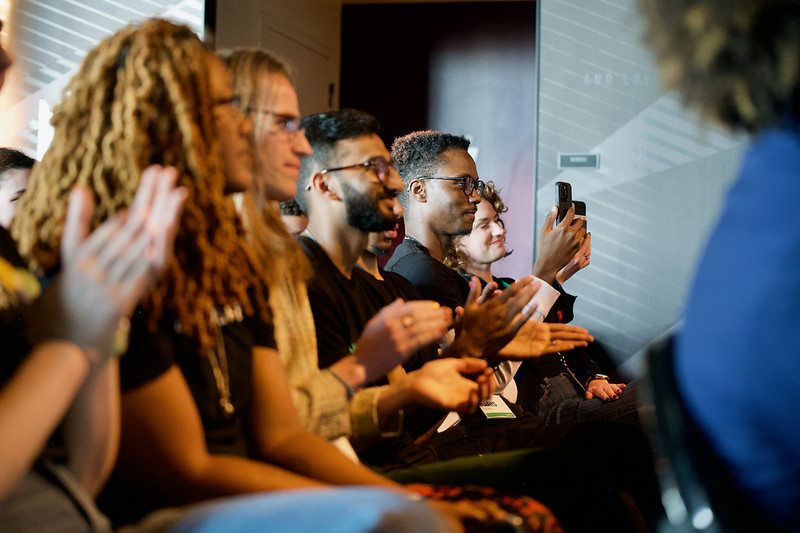
2023 cohort members during pre-demo day programming. (Courtesy photo by Joe Andrucyck, Governor’s Office)
The demo day
During her opening remarks, McDonald praised a local tech economy that she said bucked national downturn.
“Last year, when the country saw a dramatic decline in venture funding, Baltimore was up — showing that we’re not only growing but that we’re taking share from other places around the country,” she said. “And that’s no surprise to any of us who live here.”
McDonald referred to Gov. Moore as “my friend” when introducing his keynote address, during which Maryland’s first Black governor spoke about economic growth, small business development and his purported commitment to building an equity-driven environment for all entrepreneurs — including through Annapolis’ halls of power.
“Right now, we’re working with the Maryland General Assembly to create a historic Maryland community venture investment fund,” he said. “This fund will be used to invest in financial technology companies, fintech companies that develop products that help small businesses and low-income communities and help them to actually access capital — and also access customers.”
McDonald also referenced legislative plans to support Maryland entrepreneurs — specifically, a bill launched in the General Assembly in February to support creation of an Equitech Growth Fund for emerging and advanced industries.
“Many of you know there’s a bill in the legislature right now to create the first-ever Equitech fund at the state level,” McDonald said. “This is a huge breakthrough: Equitech was born in Baltimore, and the state embracing it is one of the biggest pathways for growth.”
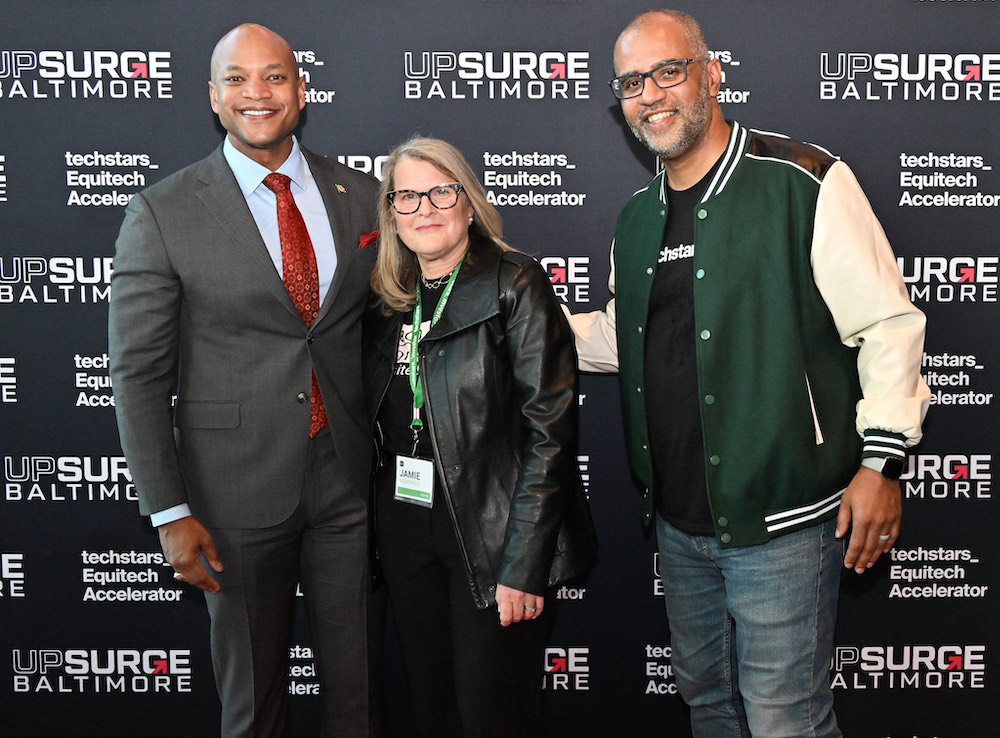
(L to R) Gov. Wes Moore, UpSurge Baltimore’s Jamie McDonald and Techstars’ Adam Phillips. (Courtesy photo by Joe Andrucyck, Governor’s Office)
What’s next for the 2023 cohort?
While some contracts and funding rounds are still in process and cannot be named specifically, the demo day produced several notable announcements. The UpSurge Baltimore team mentioned accomplishments by both Baltimore-area companies expanding their reach and non-resident companies establishing local roots. Examples include:
- ReBokeh is in diligence with a Maryland funder.
- CyDeploy finalized a funding round with mostly local funders and started diligence on local enterprise customer pilots.
- VecTech won millions in national grant funding and is planning to expand its offerings throughout the state Maryland and beyond.
- TechRow earned a funding commitment from a local venture fund and brought Baltimore institutions onto their national media platform. They are in discussions with local school systems.
- After launching its platform in DC, Frontline secured partnerships with local municipalities to bring its benefits to cities towns in Maryland. “We’re coming to Baltimore soon,” promised Frontline CEO Kala Fleming from the stage.
- Sanitas is in active diligence with a Maryland funder to bring its platform to upwards of 10,000 people in Maryland, as well as partner with five Maryland institutions.
When asked how it planned to stay connected with its latest cohort, the Upsurge Baltimore team offered UpRise as a solution. UpRise is a new program designed to support advancing Baltimore’s pre-seed and seed-stage tech startups. Leaders also emphasized their commitment to check-ins and helping the 2023 cohort members with fundraising, hiring, finding office space and accessing city and state incentives. Equitech accelerator cohort members will have additional chances to mentor early-stage founders and pitch at curated events for regional corporations, institutions, investors and conferences.
What’s next for UpSurge Baltimore?
During her on-stage address, McDonald announced a new partnership with Stanley Black & Decker on a new program for early-stage founders.
“Some of you know we had a different program with Stanley last year that sunsetted, and we’re announcing a new founder catalyst program — which is for earlier-stage founders than the group that you’re going to meet tonight,” McDonald said. “It’s going to launch in the fall and will aim to give UpSurge a continuous, year-round presence of acceleration with Techstars.”
UpSurge Baltimore team members said that a formal announcement about the program, which they aim to launch in October 2023, is in the works.
In the meantime, UpSurge Baltimore’s signature Equitech Tuesdays meetup will resume next week and take place every Tuesday at Guilford Hall Brewery — barring any future Equitech accelerators wrapping up.
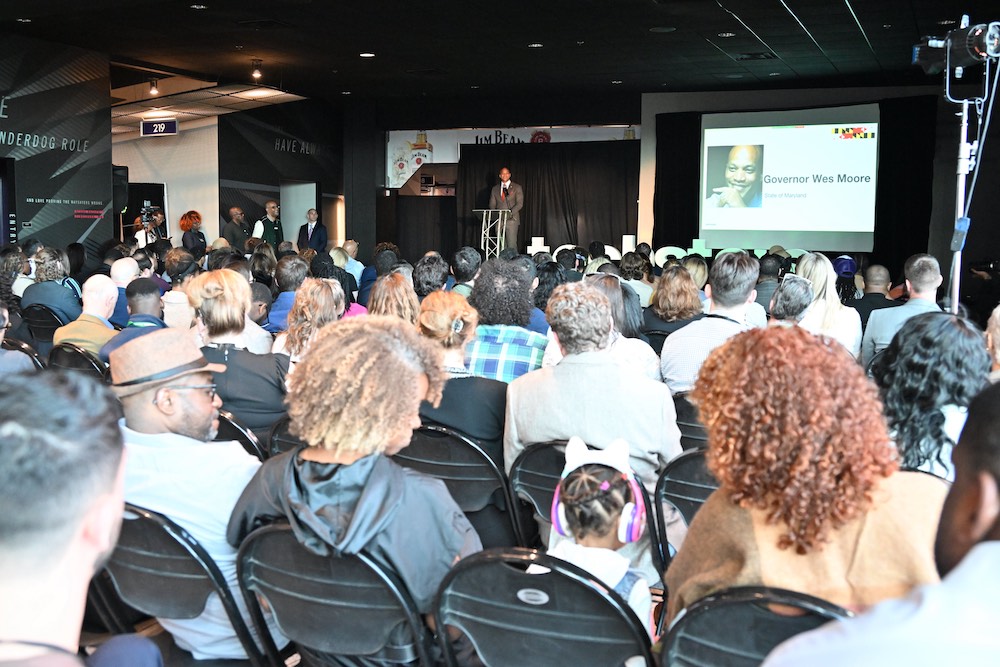
Audience members listen to Gov. Wes Moore speak. (Courtesy photo by Joe Andrucyck, Governor’s Office)
_
Technical.ly editor Sameer Rao contributed to this report.
Before you go...
Please consider supporting Technical.ly to keep our independent journalism strong. Unlike most business-focused media outlets, we don’t have a paywall. Instead, we count on your personal and organizational support.
Join our growing Slack community
Join 5,000 tech professionals and entrepreneurs in our community Slack today!

The person charged in the UnitedHealthcare CEO shooting had a ton of tech connections

From rejection to innovation: How I built a tool to beat AI hiring algorithms at their own game

Where are the country’s most vibrant tech and startup communities?


